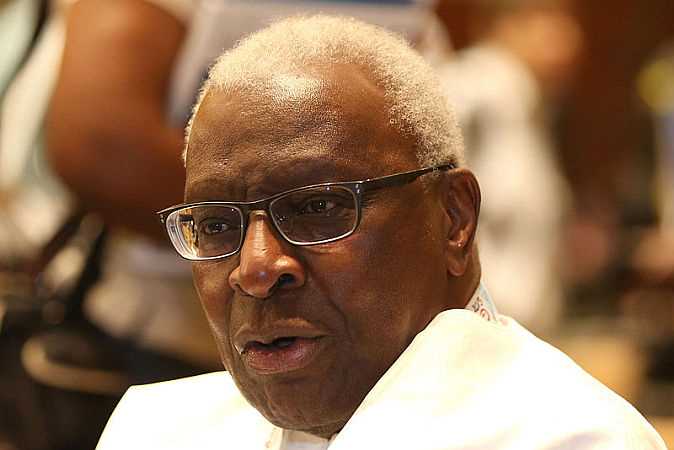There are plenty of people who will tell you the International Olympic Committee is deaf. Not this time.
Although the preparations for Tokyo 2020 were expected to be the lead item at Wednesday’s online meeting of the IOC’s Executive Board, IOC President Thomas Bach (GER) began the post-meeting media teleconference by reading a 309-word statement:
THE INTERNATIONAL OLYMPIC COMMITTEE (IOC)
CONDEMNS RACISM IN THE STRONGEST TERMS.
The IOC stands for non-discrimination as one of the founding pillars of the Olympic Movement, which is reflected in the Olympic Charter, Fundamental Principle 6:
“The enjoyment of the rights and freedoms set forth in this Olympic Charter shall be secured without discrimination of any kind, such as race, colour, sex, sexual orientation, language, religion, political or other opinion, national or social origin, property, birth or other status.”
The Olympic Games are a very powerful global demonstration against racism and for inclusivity. They are a celebration of the unity of humankind in all our diversity. Athletes from all 206 National Olympic Committees (NOCs) and the IOC Refugee Olympic Team all enjoy the same rights, respecting each other and with the same rules applying to everyone without any kind of discrimination. All these athletes live peacefully together in the Olympic Village, sharing their meals, their thoughts and their emotions.
This is in the DNA of the Olympic Games and the IOC as an organisation. Our founder Pierre de Coubertin said: “We shall not have peace until the prejudices that now separate the different races are outlived. To attain this end, what better means is there than to bring the youth of all countries periodically together for amicable trials of muscular strength and agility?”
The IOC Executive Board supports the initiative of the IOC Athletes’ Commission to explore different ways of how Olympic athletes can express their support for the principles enshrined in the Olympic Charter, including at the time of the Olympic Games, and respecting the Olympic spirit.
By participating in the Olympic Games, the athletes are proof of this principle of non-discrimination for any reason. Their respect for all their fellow athletes gives us a glimpse of how humankind as a whole could live together peacefully and respectfully.
This displaced the questions about Tokyo 2020, the scandal enveloping the International Weightlifting Federation and much more. In the following 50 minutes of questions-and-answers with the 240 media on the call, four of the 11 inquiries were about the IOC’s stance on discrimination and on its Rule 50, which prohibits protests.
The key question and reply came late in the discussion, as Graham Dunbar of The Associated Press asked:
“Regarding Rule 50, you know the Athlete’s Commission doesn’t have a great track record of listening to the athletes with the strongest opinions, nor of coming to conclusions with differ very much from the Executive Board. For the athletes that are a bit skeptical, what should give them confidence that in this process, the Athlete’s Commission could have a kind of change of view in the same way the NFL has?”
Bach answered him directly; please read this carefully:
“First of all, the Athlete’s Commission of the IOC is in regular contact with the athlete representatives from all around the world. There are regular telephone conferences, they have many bi-lateral meetings. It may be very well the case that there in the athlete’s community, there is not only one opinion, and that there are differing opinions.
“But as we could also see in the discussion about the postponement of the Olympic Games, there the opinion of the IOC Athlete’s Commission was shared, almost unanimously by all the more than 200 athlete representatives that were on a phone call . You may also recall that, in the drafting of the Athlete’s Rights and Responsibilities declaration, there were several thousands of athletes participating in this. You can also see there very intensive discussion going on on Athlete365 [IOC athlete’s site].
“So I really think the Athlete’s Commission is really taking the pulse of the opinions of the athletes and is reflecting very well the opinion of the majority of the athletes. Again, diverting opinions are a normal democratic procedure.” (emphasis added)
Bach also noted, in reply to different questions, that:
● “We must make a difference between such support for the principles enshrined in the Olympic Charter, and potentially divisive demonstrations”
and
● “The framework has been set, and now let the Athlete’s Commission – and let the athletes – discuss among themselves and then coming up with the relevant proposals.”
Translation: Bach was clear in his answer to Dunbar that the loudest voice in the room will not necessarily be the one to set the policy. That also means the loudest National Olympic Committee may not get its way, either.
All of this will focus the attention of U.S. athletes on 2018 Olympic Winter Games gold medalist Kikkan Randall, who is the lone American athlete on the IOC Athlete’s Commission. She was elected in PyeongChang for an eight-year term, which has just now gotten started after her successful, post-Games fight with cancer. She will be key to representing the “voice” of U.S. athletes in the Athlete’s Commission discussions, possibly advancing whatever comes out of the just-announced U.S. Olympic & Paralympic Committee’s athlete group.
Process is a major part of democracy. For U.S. athletes, any desire for change won’t depend on ear-splitting volume, but creating a vision of participation in the Games that can be shared by other athletes in other nations from around the world. And Randall has to carry the banner forward.
There is a lot more to process from this and more discussion coming. But this was not the only topic of the day:
● Tokyo 2020: The IOC and the Tokyo 2020 organizers have so far created about 200 proposals to try to compact the Games and hold down costs. These are principally in the areas of (1) service levels at the Games, (2) quantities of stuff ordered, (3) activities at the Games, (4) operations, such as whether full test events are needed and (5) venue use and logistics.
● Paris 2024: The IOC will maintain its schedule of approving the final list of events and sports in December 2020. Further, the old overall limit of 10,500 athletes – originally for Barcelona in 1992 – will be reinstated for 2024 and beyond. So, for the four “extra” sports requested by the Paris organizers, every athlete added to the Games will eliminate an athlete elsewhere.
● Weightlifting: The brutal report of bad governance and doping abuse submitted to the International Weightlifting Federation has led to further inquiries, with the IWF requested to provide more details for review. Bach noted that there were sections of the McLaren Report not made public and which dealt in depth with doping, and the IOC would like to see this before taking further action.
● Members: The Executive Board proposed five new members for the IOC, including World Athletics chief Sebastian Coe (GBR) on the condition that he disassociate himself from active involvement with a company which does business with the IOC. Among the other four as two really interesting choices: Saudi Arabian Princess Reema Bandar Al-Saud, the current Saudi ambassador to the United States, and former Croatian President Kolinda Grabar-Kotiarovic.
And check out the U.S. connections: Bandar Al-Saud attended George Washington University; Grabar-Kitarovic attended Los Alamos High School in New Mexico and was a Fulbright Scholar at GWU, and Mongolian candidate Battushig Batbold earned his Bachelor of Arts from the University of Chicago and Masters in Business Administration from Harvard. Remember them for the future.
There were also results changes in five Olympic events due to doping, for London 2012 (2), Rio 2016 (2) and Sochi 2014 (1).
For those looking for the worldwide impact of the George Floyd killing, the IOC has underscored it. What that means for the future, however, is that it will be part of a continuing discussion that has – amazingly – benefited from the postponement of the Tokyo Games to next year.
Rich Perelman
Editor
You can receive our exclusive TSX Report by e-mail by clicking here. You can also refer a friend by clicking here.

























